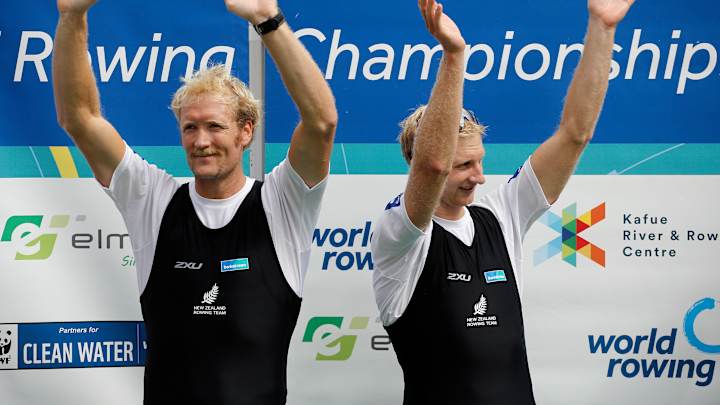New Zealand rowing pair enters Rio undefeated since 2007

When Eric Murray and Hamish Bond jump into their boat in Rio, people won't be asking whether they're going to win, but by how much.
The New Zealand pair hasn't lost a race since 2007, so anything but a third consecutive Olympic gold medal would be a major upset.
Some of their closest competitors have switched events to avoid having to compete against the blond Kiwis, something that has only strengthened their grip on the men's pair.
Here are some of the other things to watch for in the rowing competition.
NO SPLASHING
Water quality is a serious concern in the Rodrigo de Freitas lake, where an Associated Press investigation last year found high levels of viruses.
Though the international rowing federation called the water quality ''very acceptable'' at last year's Junior World Championships, its medical commission recommends rowers to ''avoid inadvertent immersion, including splashing.''
Taking no chances, the U.S. team will be training in special suits with anti-microbial features. Katelin Snyder, who coxes the U.S. women's eight, said she'd gladly skip the tradition of throwing the coxswain in the water, saying ''winning would be enough of a celebration.''
THE FANTASTIC EIGHT
The U.S. women's eight is one of most successful teams in international sports, having won every World Championship and Olympic gold medal since 2006.
The dynasty has endured even though the crews have changed. Only two rowers, Meghan Musnicki and Eleanor Logan, remain from the eight that won gold in the London Olympics.
The biggest menace to the U.S. winning streak is likely to come from New Zealand or Great Britain, which nearly caught up with the Americans in a World Cup race in May in Switzerland.
CATCHING CRABS
When rowers talk about ''catching a crab'' they're not thinking about trapping crustaceans from the boat.
The expression is used to describe what happens when the oar blade gets caught in the water at the wrong moment. This causes the oar to flip, which slows down the boat and sometimes it can knock the rower into the water.
It's rare among top-level rowers but it happens. Australia's men's four caught a crab just ahead of the finish line in a World Cup event in May, which allowed Britain to surge past them and win.
RULE BRITTANIA?
Britain topped the medal table for rowing in London 2012 with four gold, two silver and three bronze medals. It was Britain's biggest medal haul ever in the sport.
That's going to be tough to match for Team GB in Rio. Helen Glover and Heather Stanning will be hard to beat in the women's pair but 40-year-old Katherine Grainger, competing in her fifth Olympics, may find it tough to defend her gold in the women's double sculls. This time Grainger is partnering with Vicky Thornley.
Britain has won 63 Olympic medals in rowing, second only to the United States.
CROATIAN BROTHERS
Martin and Valent Sinkovic are two-time world champions in the men's double sculls and big favorites to win Croatia's first Olympic gold in rowing.
They used to race in the quadruple sculls and won the silver medal in that event in London four years ago. After teaming up in the doubles in 2014 they haven't lost a single race.
Valent, 27, is a year older that Martin. Both say they were introduced to rowing by a third brother, Matija Sinkovic.
